much和many的用法
many much的用法和区别
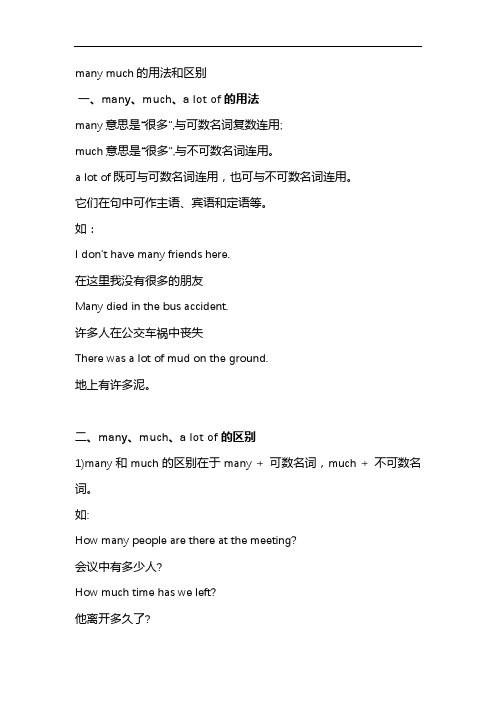
many much的用法和区别一、many、much、a lot of的用法many意思是“很多”,与可数名词复数连用;much意思是“很多”,与不可数名词连用。
a lot of既可与可数名词连用,也可与不可数名词连用。
它们在句中可作主语、宾语和定语等。
如:I don't have many friends here.在这里我没有很多的朋友Many died in the bus accident.许多人在公交车祸中丧失There was a lot of mud on the ground.地上有许多泥。
二、many、much、a lot of的区别1)many和much的区别在于many + 可数名词,much + 不可数名词。
如:How many people are there at the meeting?会议中有多少人?How much time has we left?他离开多久了?Many of the workers were at the meeting.许多工人在会议中Much of the time was spent on learning.花许多时间在学习上。
He has many friends, but few true ones.他有许多朋友,但靠谱的却没几个。
There hasn't been much good weather recently.最近都不是什么好天气。
2)a lot of(=lots of)和many、much区别在于它们只能用在肯定句中,而many,much不受限制。
如果将一个含有a lot of(=lots of)的肯定句改为否定句或疑问句,要将它们改为many或much。
如:We can see a lot of birds in the tree.We can't see many birds in the tree.我们在树上看不到很多鸟儿。
manymuch的用法和区别有什么区别
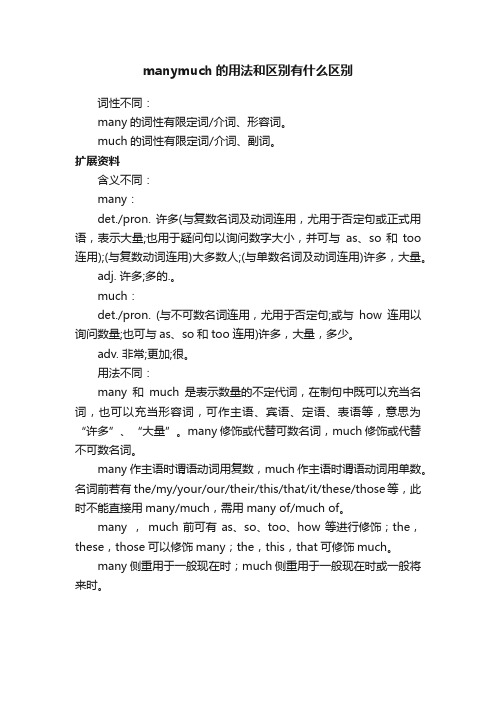
manymuch的用法和区别有什么区别
词性不同:
many的词性有限定词/介词、形容词。
much的词性有限定词/介词、副词。
扩展资料
含义不同:
many:
det./pron. 许多(与复数名词及动词连用,尤用于否定句或正式用语,表示大量;也用于疑问句以询问数字大小,并可与as、so 和too 连用);(与复数动词连用)大多数人;(与单数名词及动词连用)许多,大量。
adj. 许多;多的.。
much:
det./pron. (与不可数名词连用,尤用于否定句;或与how连用以询问数量;也可与as、so和too连用)许多,大量,多少。
adv. 非常;更加;很。
用法不同:
many和much是表示数量的不定代词,在制句中既可以充当名词,也可以充当形容词,可作主语、宾语、定语、表语等,意思为“许多”、“大量”。
many修饰或代替可数名词,much修饰或代替不可数名词。
many作主语时谓语动词用复数,much作主语时谓语动词用单数。
名词前若有 the/my/your/our/their/this/that/it/these/those等,此时不能直接用many/much,需用many of/much of。
many ,much前可有as、so、too、how等进行修饰;the,these,those可以修饰many;the,this,that可修饰much。
many侧重用于一般现在时;much侧重用于一般现在时或一般将来时。
much和many的区别及用法

much和many的区别及用法
两者都表示“许多”,但many 修饰或代替可数名词(复数),与few(少数)相对;而much 用来修饰或代替不可数名词(单数),与little(少量)相对。
1much 和many 的区别是什幺1. 两者都表示“许多”,但many 修饰或代替
可数名词(复数),与few(少数)相对;而much 用来修饰或代替不可数名词(单数),与little(少量)相对。
如:
Did you see many people there?
你在那儿看见许多人了吗?
Many poets have died young.
许多诗人很年轻就死了。
Do you have much money left?
你剩的钱多吗?
He doesn’t spend much time preparing his lessons.
他备课不花太多时间。
2. 关于many of 和much of:
(1) 其后接名词时,该名词通常应是特指的(比如有the, these, those, my, our, Tom’s等修饰)。
如:
Many of the farmers grow rice.
很多农民种稻子。
many和much的用法

many和much的用法many和much的用法,大家知道的吗?接下来,小编给大家准备了many和much的用法,欢迎大家参考与借鉴。
many和much的用法(1)many修饰复数可数名词,表许多; much修饰不可数名词,表量或程度。
He has many friends, but few true ones.There hasn’t been much good weather recently.(2)many a: many a和many同义,但语气比较强,并且要与单数名词及单数形动词连用。
Many a prisoner1 has been set free. (=Many prisoners2 have been set free.)(3)as many和so many均等同于the same number of。
前有as, like时, 只能用so many。
These are not all the books I have. These are as many more upstairs.They worked like so many ants.(4)as much等同于the same amount of,表同量和同一事情。
He bought two pounds of sugar and as much tea. 〔同量)I was not in the least surprised, for I had fully3 expected as much. 〔同一事情)(5)many和much之后不接名词时,作为代名词;另外much也可用副词。
Many of them were very tired.I don’t eat much for lunch. 〔代名词)He is much taller than I. (副词〕扩展:表示“许多”的词组的对比分析(1) plenty of, a lot of, lots of均表“许多”,修饰复数可数名词或不可数名词。
不定代词much、many的用法总结

不定代词much、many的用法总结下面是小编整理的一些关于much、many的用法总结,希望对大家有帮助。
不定代词much、many的用法总结many(很多,可数):用法和much相同,在句子里可用作主语、宾语和定语等。
如:Many of us are from the rural areas.(主语)Before the 1950's in our factory no warker had a bicycle or sewing machine, now many have both.(主语)How many do you want?(宾语)There are many cars in the streets.(定语)【注一】:much用于不可数名词,动词用单数。
many用于可数名词,动词用复数。
如:There are not many mistakes in his exercise.Much of what he said is true.【注二】:在日常口语的肯定结构中,much和many常由a lot of或lots of代替。
如:He has put a lot of sugar in his porridge.(a lot of代替much) Our government spends a great deal of money on schools.(也可用a great deal of代替much)A lot of birds come here in the spring.(a lot of代替many)There are a large number of islands in the South Seas.(也可用a large number of代替many)much(很多,不可数):相当于名词、数词和形容词,在句中可用作主语、宾语或定语。
如:Much has been done to increase cotton output.(主语)He didn't say much, but every word was to the point.(宾语) There is not much water left in the thermos flask.(定语)【注】:much在下面例子中用作状语。
many和much的用法
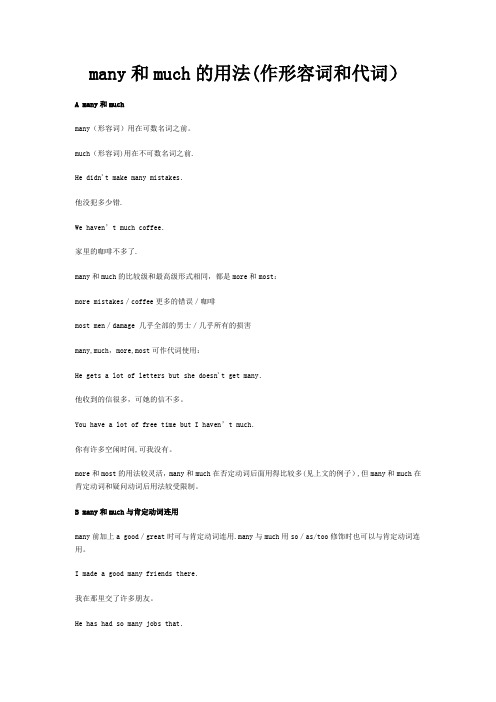
many和much的用法(作形容词和代词)A many和muchmany(形容词)用在可数名词之前。
much(形容词)用在不可数名词之前.He didn't make many mistakes.他没犯多少错.We haven’t much coffee.家里的咖啡不多了.many和much的比较级和最高级形式相同,都是more和most:more mistakes/coffee更多的错误/咖啡most men/damage 几乎全部的男士/几乎所有的损害many,much,more,most可作代词使用:He gets a lot of letters but she doesn't get many.他收到的信很多,可她的信不多。
You have a lot of free time but I haven’t much.你有许多空闲时间,可我没有。
more和most的用法较灵活,many和much在否定动词后面用得比较多(见上文的例子),但many和much在肯定动词和疑问动词后用法较受限制。
B many和much与肯定动词连用many前加上a good/great时可与肯定动词连用.many与much用so/as/too修饰时也可以与肯定动词连用。
I made a good many friends there.我在那里交了许多朋友。
He has had so many jobs that.他做过了这么多种工作,以致……She read as much as she could.她尽量多读书。
They drink too much(gin).他们(杜松子酒)喝得太多了.many是宾语或宾语的一部分而前面不加任何修饰语时,常常被 a lot/lots of(+名词)或a lot,lots (代词)代替.much是宾语或宾语的一部分时常常被a great/good deal of(+名词)或agreat/good deal (代词)代替:I saw a lot/lots of seabirds.I expect you saw a lot too.我看到了许多海鸟.想必你也看到了许多。
much和many的区别
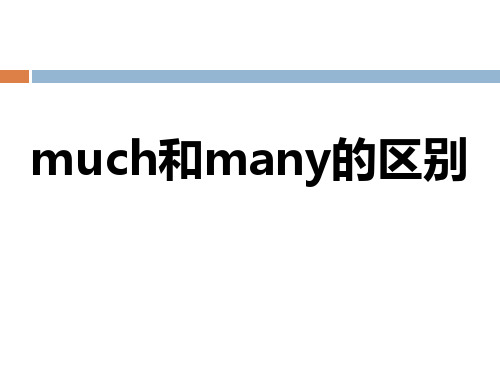
教材典据
1.都是数量的不定代词。 2.意思是“许多”、“大量”。 3.在句中,既可以充当名词,也可以充当形容词。 4any修饰或代替可数名词,如many books.
6.much修饰或代替不可数名词,如much water.
7.much可以修饰动词,many不行。 eg. She eats too much.她吃得太多了。 8.much可以修饰比较级,many不行。 eg. He's much taller than her.他比她高得多。
11.many、much前可有as、so、too、how等进行 修饰。
12.the、these、those可以修饰many. the、this、that可以修饰much.
语法探究
9.many作主语时,谓语动词用复数。 eg. Many students are 15 years old. much作主语时,谓语动词用单数。 eg. Much water is clean.
10.名词前若有the、my、your、our、their、 this、that、it、these、those等。不能直接用 many或much,要用many of或much of. eg. Many of them are students. eg. Much of the information is good for us.
much跟many的用法
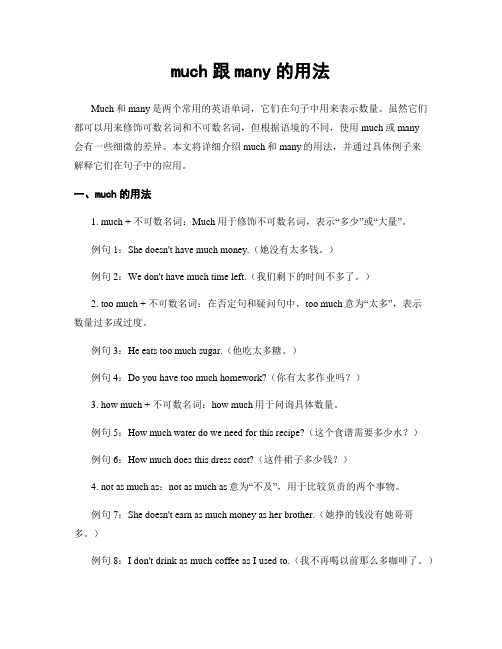
much跟many的用法Much和many是两个常用的英语单词,它们在句子中用来表示数量。
虽然它们都可以用来修饰可数名词和不可数名词,但根据语境的不同,使用much或many会有一些细微的差异。
本文将详细介绍much和many的用法,并通过具体例子来解释它们在句子中的应用。
一、much的用法1. much + 不可数名词:Much用于修饰不可数名词,表示“多少”或“大量”。
例句1:She doesn't have much money.(她没有太多钱。
)例句2:We don't have much time left.(我们剩下的时间不多了。
)2. too much + 不可数名词:在否定句和疑问句中,too much意为“太多”,表示数量过多或过度。
例句3:He eats too much sugar.(他吃太多糖。
)例句4:Do you have too much homework?(你有太多作业吗?)3. how much + 不可数名词:how much用于问询具体数量。
例句5:How much water do we need for this recipe?(这个食谱需要多少水?)例句6:How much does this dress cost?(这件裙子多少钱?)4. not as much as:not as much as意为“不及”,用于比较负责的两个事物。
例句7:She doesn't earn as much money as her brother.(她挣的钱没有她哥哥多。
)例句8:I don't drink as much coffee as I used to.(我不再喝以前那么多咖啡了。
)二、many的用法1. many + 可数名词复数:Many用于修饰可数名词复数,表示“许多”或“大量”。
例句9:There are many students in the classroom.(教室里有很多学生。
- 1、下载文档前请自行甄别文档内容的完整性,平台不提供额外的编辑、内容补充、找答案等附加服务。
- 2、"仅部分预览"的文档,不可在线预览部分如存在完整性等问题,可反馈申请退款(可完整预览的文档不适用该条件!)。
- 3、如文档侵犯您的权益,请联系客服反馈,我们会尽快为您处理(人工客服工作时间:9:00-18:30)。
Many和Much用法
①many和much都作“许多”解,但many用于修饰可数名词,而much修饰不可数名词。
例如:
1. China has many oil fields. 中国有许多油田。
2. In our view, there is much oil here. 在我们看来,这里有许多石油。
②代词many和名词much用法举例:
1. Many of the students want to sum up the past experience before going on. 许多学生(原意为:学生中间有许多人)要总结一下过去经验在继续干。
2. Much of the waste acid is utilized. 废酸中大部分被利用了。
Many of the workers were at the meeting.
Much of the time was spent on learning.
③“much(副词)+比较级”作“……得多”解:
1. The sun is much large than the moon. 太阳比月亮大得多了。
2. This problem seems much more difficult than that one.
这道题似乎比那道题难得多。
④副词much修饰动词、过去分词时作“十分”解:
1. We all love Beijing very much. 我们大家都非常热爱北京。
注:上述两种句子,一般不能用very代替much。
⑤ many和much的一些常用词组:
many a time 许多次 how many books 多少书 how much water 多少水
as much (many) as 像……那么多
much加不可数名词,如much milk many加可数名词复数,如many apples
How many加可数名词复数,如How many pears
How much加不可数名词,如How much water
How much也可用于问价钱,如How much are the apples意思是这些苹果多少钱这是How many 与How much的最大区别
Some和any 既可以修饰可数名词又可以修饰不可数名词,some常用在肯定句中,而any则常用在否定和疑问句中。
因此 some和any 的用法主要是考虑用在肯定句、疑问句还是否定句中,与名词的可数与否无关。
some意为“一些”,可作形容词和代词。
它常修饰可数名词复数。
如:some books一些书,some boys一些男孩,也可修饰不可数名词,如:some water一些水,some tea一些茶叶,some常用在肯定句中。
any 意为“任何一些”,它也可修饰可数名词复数或不可数名词,常用于疑问句和否定句。
如:
s
--I have some tea here. 我这儿有些茶叶。
--Do you have any friends at school 你在学校有些朋友吗
--I have some English books我有英语书
但在表示建议,反问,请求的疑问句中,或期望得到肯定回答时,多用some而不用any。
如: Would you like some coffee 你要不要来点咖啡
What about some fruit juice 来点水果汁如何
当any表示“任何”的意义,起强调作用时,它可以用在肯定句中;
Any student can answer this question.任何学生都可以回答这个问题。
:
辨析some和any的不同用法:some 常用在肯定句中,而any 则常用在否定和疑问句中。
在表示建议,反问,请求的疑问句中,或期望得到肯定回答时,多用some而不用any。
副词enough要放在形容词副词的后面,形容词enough放在名词前后都可。
例如:
I don't know him well enough. 他我不熟悉。
mmmmmThere is enough food for everyone to eat.有足够的食物供每个人吃。
There is food enough for everyone to eat.
a lot当然不是名词性短语了,而是副词性短语,修饰动词。
比如:Thanks a lot.= Thanks very much.
再比如:I know him a lot。
代词代词pronoun,简称pron.是代替的一种词类。
大多数代词具有名词和的功能特征及在句中的作用分为:、、、反身代词、、、、连接代词和九种。
不定代词:
没有明确指定代替任何特定名词或形容词的词叫做不定代词,常用不定代词如下:
all,any,another,both,each,every,either,few,little,many,much,no,none,neither,one,other,some以及
由some,any,no,every 和body,one,thing 构成的复合词。
不定代词的用法:
不定代词代替名词或形容词.在句中可用作主语,宾语,表语和定语。
Everybody should be here in time tomorrow.明天大家都要按时到。
I know nothing about it.这件事情我一点都不知道。
That's all I know.这就是我知道的。
不定代词的具体用法:
常见的不定代词有all,both,each,every等,以及含有some-,any-,no-等的合成代词,如anybody,something,no one。
这些不定代词大都可以代替名词和形容词,在句中作主语、宾语、表语和定语,但none和由some,any,no等构成的复合不定代词只能作主语、宾语或表语;every和no只能作定语。
如:
--- Do you have a car--你有一辆小汽车吗
--- Yes,I have one.--是的,我有一辆。
--- I don't know any of them.他们,我一个也不认识。
any:一些,任何。
any 多用作否定或疑问句中,any 在句中作主语,宾语,定语。
any作定语时,所修饰的名词没有单复数限制,一般多用复数,any 用在肯定句中,表示"任何"。
Do you have any books你有书吗
You can come any time.你什么时候都可以来。
some:一些,某些,某个。
some 多用在肯定句中,表示邀请或者对方可能给予肯定回答的疑问句中等。
There are a lot of flowers in the garden,some are white,which I like very much.
花园里有许多花,一些是白色的,我特别喜欢。
I am going to get some ink.我去弄点墨水。
Will you have some coffee,please喝点咖啡吗
no:无.在句中作定语.表示否定,语气要比not any 强.
She knows no English.她根本就不懂英语。
I have no bike.我就没有自行车。
None 既可以指人也可以指物,其后通常接of短语,用作主语时,若指不可数名词,谓语只能用单数,若指复数名词时,则谓语可用单数(较正式),也可以用复数(非正式语体)如:None of the milk can be used.
None of the films is/are worth seeing.
many:许多.在句中作主语,宾语,定语. many 在句中代替可数名词。
Many of the students like English very much.许多学生非常喜欢英语。
I have many books to give you.我有许多书要给你。
much:许多。
在句中作主语,宾语,定语。
much 在句中代替不可数名词。
There is not much ink in the bottle.瓶子里没多少墨水了。
a few,a little,few,little.:几个,一点儿,没几个,没多少。
它们在句中作主语,宾语,定语,其中a few 和few 代替可数名词,a little和little 代替不可数名词,它们表示少量,不多,几个,只是主观上的一种相对说法,并没有具体的数量标准。
Few of the books are cheap now.现在没几本儿书是便宜的。
A few friends came to see me yesterday.昨天有几个朋友来看我。
I have a little money to buy the book.我的这点钱能买这本书。
There is little water in the thermos.暖水瓶没多少水了。
